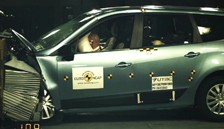EuroNCAP has released the crash test results for five new cars - the Citroen
Nemo, the Kia Venga, the Nissan Cube, the Seat Exeo and the Toyota Verso.
Only one car, the Toyota Verso, received the maximum five star rating.
The latest results
- TOYOTA Verso (2.0 D-4D LHD) SMALL MPV 2010 5 stars
- KIA Venga (1.4 Petrol GLS) SMALL MPV 2010 4 stars
- NISSAN Cube (1.6 Look, Zen LHD) SMALL MPV 2010 4 stars
- SEAT Exeo (1.6 Reference LHD) LARGE FAMILY 2010 4 stars
- CITROËN Nemo ( 1.4 HDi Combi Plus LHD) SMALL MPV 2010 3 stars
New rules and further demands in European legislation in 2010, means this year carmakers face even tougher challenges.
In 2010, EuroNCAP raised the bar for carmakers to achieve five stars across three
areas of safety protection.
Performance thresholds for Adult Occupant Protection and Child Occupant Protection rise from 75% to 80% and from 70% to a 75% respectively.
However, it is in Pedestrian Protection where the difference is felt the keenest increasing the minimum level required from 25% to 40%.
The Toyota Verso achieved 69% in pedestrian protection.
The Citroen Nemo Multispace is a direct derivative of the Nemo commercial van. The car achieved an overall rating of three stars and a lacklustre 29% in Safety Assist as Electronic Stability Control and Speed Limitation Assistance are both not available as options.
The low score in Adult Occupant Protection is attributed to the lack of a standard curtain airbag and poor whiplash performance of the seats.
The Seat Exeo, a saloon car based on the previous generation Audi A4, achieved an
overall rating of four stars. Stiff structures in the dashboard presented an elevated risk
of injury to knees and femurs, which the fitted knee airbag was unable to mitigate.
However, the car did well in protection of pedestrians and the infants in the rear. The
Nissan Cube, otherwise a solid performer, was let down by its child occupant protection
during the frontal impact test with a overall four star rating as the result.
The Kia Venga also achieved a four star rating, although not without problems. During
the frontal test the driver seat belt was partially cut by the lower seat rail, a serious flaw
that potentially can undermine proper restraint of both frontal occupants. Kia swiftly introduced a solution and is currently taking market action to respond to EuroNCAP’s
findings.
Dr Michiel van Ratingen, Secretary General of Euro NCAP said: “Any reduction of the
performance of the seat belt not only poses a serious risk to the driver and passenger,
but also compromises the validity of the Euro NCAP rating awarded to the car.
Customers must ensure that the modification is fitted, so that the four star rating
applies.”














Login to comment
Comments
No comments have been made yet.